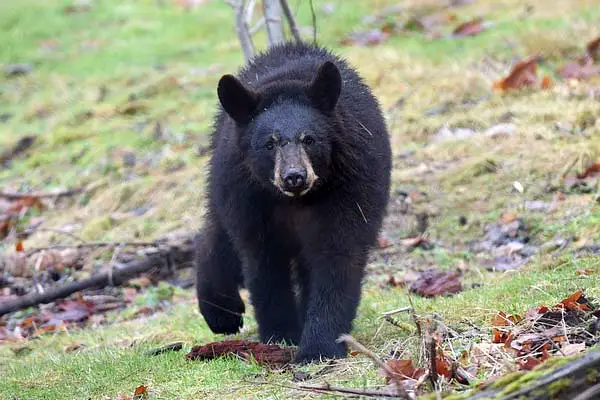When Do Bears Hibernate in Canada? 11 Things to Know
Bears are hulking, adorable creatures that eat berries, bugs, and salmon. However, they are also homebodies. They spend the majority of their lives sleeping or eating.
In truth, a bear only meanders away from its den for a handful of reasons: mating season, food or water scarcity, or confrontations with other bears over territory.
As most animals hibernate in the wintertime to stay warm, a few types of wildlife have adapted to survive in some of the world’s most extreme climates. One of these animals is the bear.
In Canada, both the black and grizzly bears hibernate in the winter from around October or November to around April, or when the snow melts.
They take advantage of the fact that bears are warm-blooded mammals. This allows them to enter a naturally produced state of dormancy-like hypometabolism during hibernation.
To increase your chances of spotting Bears by visiting outside of these months. Listen out for the cubs’ shrill howls and the adult bears’ woofs when you’re exploring the forests.
1. When Bears Hibernate in Canada?
Most bears in Ontario hibernate from November to April, but the exact timing depends on local conditions.
Bears do not hibernate continuously for six months. They may emerge from their dens on warm winter days to eat. Bears also enter a state of dormancy when pregnant females give birth and during periods of food scarcity.
When conditions are favorable, bears may not hibernate at all. In milder climates, bears usually consume enough food in the summer to last through the winter without entering a deep state of hibernation.
2. What is Hibernation?
Technically, hibernation is a prolonged state of inactivity and metabolic depression in animals during winter. Hibernation is a winter survival strategy commonly used by animals in places where food is scarce, and the weather gets freezing.
In these conditions, animals that can’t migrate must find a way to survive until spring.
3. Types of Hibernation
There are two types of hibernation: actual and torpor. True hibernation is when an animal’s body temperature drops to match the temperature of its environment, and it becomes unable to move voluntarily.
Torpor is when an animal will go into a state of “lazy” hibernation, where it will be able to move around as much as it wants but with much more effort than usual.
4. Changes That Take Place During Hibernation
During this time, an animal adapts by lowering its body temperature, slowing its heart rate, and breathing slower. This allows the animal to enter a deep sleep during which it doesn’t eat, drink, urinate or defecate.
This way, it requires little food and water during winter when these resources are unavailable. You could think of hibernation as a very long nap! Many animals hibernate during the winter and wake up hungry in the spring.
5. Can Bears Hibernate Whenever They Feel Like It?
Yes, bears can hibernate whenever they feel like it. However, bears will not hibernate when there is food available. Bears are opportunistic animals and, therefore, will not sleep away the winter if there is easy food to be had.
6. How Are Bears Hibernators?
Bears are true hibernators — they go into a deep sleep in winter and don’t eat anything for up to eight months! But not all bears sleep for such a long time.
Some bears live in warmer climates where they don’t need to hibernate for as long. In parts of Canada where it stays cold for several months, black bears hibernate from October to April.
Brown bears usually start their hibernation later because they need more time to gain weight before the long winter sleep
7. Do the Different Types of Bears Hibernate Differently?
The Grizzly Bear is not as extreme in its hibernation as other bears. It will wake up from time to time during the winter and scavenge for food.
The Black Bear, on the other hand, will sleep for seven months at a stretch with no eating, drinking, or going to the bathroom. The Black Bear is one of the longest hibernating animals globally.
8. How Do Bears Get Ready for Hibernation?
Bears get ready to hibernate about when apples are ripe for picking. Bears begin to gain weight in the fall by eating as much food as possible. Bears weigh between 180 to 600 pounds when they hibernate.
Female bears give birth to cubs and nurse them for about a month before going into winter sleep, called torpor.
The cubs are born blind and helpless and remain with their mother until the following spring when she comes out of her den.
9 Why Do Bears Hibernate?
Avoiding bad weather conditions such as cold temperatures and ice storms, avoiding high predation risk due to fewer available resources for predators, saving energy until more favorable conditions exist, which may allow them to reproduce successfully or reach a better feeding area.
10. Where Do Bears Go During Hibernation?
According to the National Wildlife Federation, hibernating bears stay close to home, typically in dens dug from the sides of hills. They may also use hollow logs or even caves as holes in some cases.
Black bears are more apt to den in trees than other bears, while polar bears only dig dens when snow is deep enough to cover them. Bears do not eat during this time, so they have to have a thick layer of fat before entering their dens.
11. How Do You Tell if a Bear Is Losing Its Hardiness for Winter, or if It Is Approaching Maturity?
The first of these is the age of the bear. If it is a cub or its first winter, it will not hibernate because it needs to eat as much as possible to survive the winter.
It will also be smaller and more vulnerable to predators such as wolves. In other words, a young bear cannot hibernate. Even if it does go into hibernation, it will not enter deep sleep as an adult bear can.
However, if a bear has had a good summer and fall and is approaching maturity, it will lose its hardiness for winter. When the weather begins to warm up again in the spring, the bear will stop eating and become lethargic.
This is called “denning.” In denning mode, bears do not eat much at all; they just sleep most of the time.
During this period, they also avoid predators like wolves by staying in their dens and avoiding contact with other animals.
Hibernation is a winter survival strategy employed by many different species. The physiological changes that occur during hibernation are typically triggered by a lack of food, availability of food, or temperature fluctuations. To stay warm during hibernation, bears build up large fat reserves and reduce their metabolic rates to survive the winter months.







